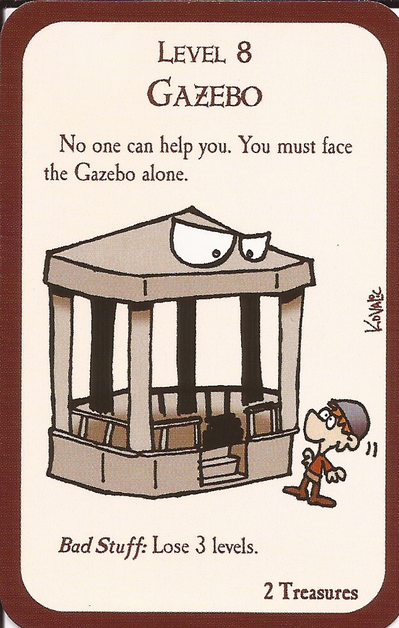Results 121 to 150 of 150
Thread: The Gazebo Problem
-
2020-10-01, 08:01 AM (ISO 8601)Ettin in the Playground


- Join Date
- Dec 2015
-
2020-10-01, 08:15 AM (ISO 8601)Titan in the Playground


- Join Date
- May 2016
- Location
- The Lakes
 Re: The Gazebo Problem
It is one thing to suspend your disbelief. It is another thing entirely to hang it by the neck until dead.
Re: The Gazebo Problem
It is one thing to suspend your disbelief. It is another thing entirely to hang it by the neck until dead.
Verisimilitude -- n, the appearance or semblance of truth, likelihood, or probability.
The concern is not realism in speculative fiction, but rather the sense that a setting or story could be real, fostered by internal consistency and coherence.
The Worldbuilding Forum -- where realities are born.
-
2020-10-01, 08:21 AM (ISO 8601)Titan in the Playground


- Join Date
- Sep 2015
-
2020-10-01, 08:44 AM (ISO 8601)Bugbear in the Playground


- Join Date
- Jul 2017
 Re: The Gazebo Problem
Re: The Gazebo Problem
Or the games expects the players to try to come up with solutions to problems without having to roll at all. Rolling is considered a fail state and is seen more as a saving throw. Or the games may have mechanics for pushing the rolls, granting rerolls at a cost, but which makes the total chance of succeeding much higher.
-
2020-10-01, 09:53 AM (ISO 8601)Ettin in the Playground


- Join Date
- Aug 2010
 Re: The Gazebo Problem
"Gosh 2D8HP, you are so very correct (and also good looking)"
Re: The Gazebo Problem
"Gosh 2D8HP, you are so very correct (and also good looking)"
-
2020-10-01, 01:23 PM (ISO 8601)Titan in the Playground


- Join Date
- May 2016
- Location
- The Lakes
 Re: The Gazebo Problem
Re: The Gazebo Problem
I'm not talking about that sort of thing, though I'm not a fan of those push mechanics.
What I'm talking about is when the game is just vanilla task-resolution, no rerolls or push, no "yes but", and yet the math and odds just don't match up with the expectations.It is one thing to suspend your disbelief. It is another thing entirely to hang it by the neck until dead.
Verisimilitude -- n, the appearance or semblance of truth, likelihood, or probability.
The concern is not realism in speculative fiction, but rather the sense that a setting or story could be real, fostered by internal consistency and coherence.
The Worldbuilding Forum -- where realities are born.
-
2020-10-01, 01:28 PM (ISO 8601)Ettin in the Playground


- Join Date
- Aug 2010
-
2020-10-01, 01:36 PM (ISO 8601)Titan in the Playground


- Join Date
- May 2016
- Location
- The Lakes
 Re: The Gazebo Problem
Re: The Gazebo Problem
There's
one about "Vikings" I can't recall the name of right now,Yggdrasill, where an average PC characteristic will fail to succeed on certain challenges set at average difficulty about 60% of the time because everything is set up to be characteristic + skill, but there are certain things that no skills apply to. The example that jumps out is Strength tests, which from what I can see often have no skill that applies.Last edited by Max_Killjoy; 2020-10-01 at 07:12 PM.
It is one thing to suspend your disbelief. It is another thing entirely to hang it by the neck until dead.
Verisimilitude -- n, the appearance or semblance of truth, likelihood, or probability.
The concern is not realism in speculative fiction, but rather the sense that a setting or story could be real, fostered by internal consistency and coherence.
The Worldbuilding Forum -- where realities are born.
-
2020-10-01, 05:16 PM (ISO 8601)Troll in the Playground


- Join Date
- Aug 2005
- Location
- Toronto, Canada
- Gender

 Re: The Gazebo Problem
Re: The Gazebo Problem
Another game system for which that was the case was Serenity, the first edition of the much-improved Cortex system. In Serenity, you rolled one die for your Attribute and one for your Skill; in both cases, the die was between d4 and d12 (at very high levels, you could get a 'die' of d12+d2.) Generally, starting characters could get one or two Attributes and one or two Skills at d10, with the rest cascading down from there. They also set it up so that there were 23 skills, of which you could reasonably purchase 8 to 10, and also if you bought a skill past d6 you had to choose a Specialty and you only got the d6 on any other application (so for example, if you took Medicine d10, you would actually have Medicine d6 and Surgery d10.) You could buy extra specialties at full cost from a base of d6.
Difficulties looked okay on the surface - 3 for easy actions, 7 for average, 11 for hard, and then scaling up through Formidable (15), Heroic (19), Incredible (23), Ridiculous (27), and Impossible (31). This meant, in theory, that if you had 2d6 you had a 58% chance of success on average difficulty tasks, and if you had 2d10 you were at 55% chance of Hard. The problem is that the scale went way up past Hard and what was defined as "Hard" was... all over the map.
Hard tasks included things like "Open professional locks", "shoot a cola can at close range", "run a daily business for a major corporation", or "remember information from a college textbook." This is a difficulty that you can only manage 3/5 of the time at a high level of specialization, which the absolute best possible build in the game is still messing up three times in twenty, and which a moderately skilled and talented person will only succeed at one time in five.
Heroic tasks, something that a person with 2d10 could only manage 10% of the time, included such impossibilities as "shoot the guy holding your friend hostage", "intimidate a hardened war veteran", or "break five cinder blocks in one hit." It is impossible to reach a level of skill that allows for accomplishing these feats with a 1 in 3 chance of success. And there are three more difficulty tiers above it.
In theory, you're supposed to use your plot points to improve your rolls when you want to do something heroic, but you don't get very many of them, they don't give you a very large advantage, you need them for non-roll abilities, and you need to not spend them if you want to gain experience.If you like my thoughts, you'll love my writing. Visit me at www.mishahandman.com.
-
2020-10-01, 06:49 PM (ISO 8601)Colossus in the Playground


- Join Date
- Jan 2006
- Location
-
2020-10-01, 10:06 PM (ISO 8601)Ogre in the Playground


- Join Date
- Dec 2018
- Location
- Space Australia
- Gender

 Re: The Gazebo Problem
Re: The Gazebo Problem
usually the result of having a supply contract with either PepsiCo or the Coca-Cola Company
If they have Coke, they'll have Sprite, Fanta, and sometimes Lift
If they have Pepsi, they'll have Mountain Dew, and sometimes 7up (a bit rarer to see here)
Here in Australia, if a place has Solo, they'll be unlikely to have Lift, and in turn will more likely have the Pepsi line up than the Coke line up.
-
2020-10-02, 08:37 AM (ISO 8601)Titan in the Playground


- Join Date
- May 2016
- Location
- The Lakes
 Re: The Gazebo Problem
It is one thing to suspend your disbelief. It is another thing entirely to hang it by the neck until dead.
Re: The Gazebo Problem
It is one thing to suspend your disbelief. It is another thing entirely to hang it by the neck until dead.
Verisimilitude -- n, the appearance or semblance of truth, likelihood, or probability.
The concern is not realism in speculative fiction, but rather the sense that a setting or story could be real, fostered by internal consistency and coherence.
The Worldbuilding Forum -- where realities are born.
-
2020-10-02, 10:45 AM (ISO 8601)Titan in the Playground


- Join Date
- Jul 2013
-
2020-10-02, 11:13 AM (ISO 8601)Ettin in the Playground


- Join Date
- Aug 2010
 Re: The Gazebo Problem
Re: The Gazebo Problem
Interesting. I think I've got that so I'll have to check it out.
When I see stuff like that I have to always wonder if there's other aspects of hte system (like plot points, etc.) that are supposed to come into play. Like, with Fate Core, if you don't use Create Advantage you're gonna have a bad time."Gosh 2D8HP, you are so very correct (and also good looking)"
-
2020-10-02, 12:02 PM (ISO 8601)Troll in the Playground


- Join Date
- Aug 2005
- Location
- Toronto, Canada
- Gender

 Re: The Gazebo Problem
Re: The Gazebo Problem
Based on how Cortex developed, my theory is that the designers were expecting that plot points would really take over and be a massive resource that is constantly being spent and recovered. The rules note that the maximum number of plot points you can hold at a time is 12, which seems to indicate that they think it's not uncommon to have ten of them in your pool, and it's conceivable that the "1 plot point for doing something really cool" reward was actually meant to be given out multiple times per scene. If one set of designers assumed "each player will only roll once or twice per scene" and "each player will have 2-4 more plot points to play with each scene", scaling difficulties so that you have to keep spending those plot points makes sense. But then you have other sections of the rules that definitely assume that players are rolling for everything and that you're only getting plot points for really cool things, and the whole system falls apart.
(Plus in general, any system that says "at the end of the session, you don't get any experience points if you have six or fewer plot points left" is going to wildly discourage spending them. But that's a huge experience mistake, not a huge die scaling mistake.)If you like my thoughts, you'll love my writing. Visit me at www.mishahandman.com.
-
2020-10-02, 12:40 PM (ISO 8601)Titan in the Playground


- Join Date
- May 2016
- Location
- The Lakes
 Re: The Gazebo Problem
Re: The Gazebo Problem
Tying XP to the same same general pool of points used to affect rolls, and forcing that choice on players, has always struck me as less than great. It was the one thing I really disliked about WEG d6 Star Wars, with character points also being used to affect rolls. It puts a player with bad luck in a couple sessions terminally behind, because they're using their CPs to save rolls instead of making their actual stats that go into those rolls better, which just means they'll end up facing that choice more often in the future too.
On Cortex/Serenity, it almost sounds like some of the devs were thinking it was "task resolution", and others were thinking it was "conflict resolution", or that half were thinking "roll for everything" and the other half were thinking "only roll when there's a question" or "only roll when the outcome is 'interesting'".
Heh.
But it's not just that, it makes any sort of difficulty target number hard to set such that it doesn't become a big gap between characters.
If it's just a d4 and a d20, a TN/DC/whatever of just 5 becomes impossible for the d4 and an 80% success rate for the d20. That's a huge range of capability.
From various discussions with and comments by game devs who use these systems, I get the feeling that they think "d4, d6, d8, d10, d12, d20, there's our scale of stats" is so elegant and simple, so obvious, so clever, that they don't stop to look at how it doesn't fit a lot of settings.Last edited by Max_Killjoy; 2020-10-02 at 12:55 PM.
It is one thing to suspend your disbelief. It is another thing entirely to hang it by the neck until dead.
Verisimilitude -- n, the appearance or semblance of truth, likelihood, or probability.
The concern is not realism in speculative fiction, but rather the sense that a setting or story could be real, fostered by internal consistency and coherence.
The Worldbuilding Forum -- where realities are born.
-
2020-10-02, 01:09 PM (ISO 8601)Ettin in the Playground


- Join Date
- Aug 2010
 Re: The Gazebo Problem
"Gosh 2D8HP, you are so very correct (and also good looking)"
Re: The Gazebo Problem
"Gosh 2D8HP, you are so very correct (and also good looking)"
-
2020-10-02, 01:36 PM (ISO 8601)Titan in the Playground


- Join Date
- May 2016
- Location
- The Lakes
 Re: The Gazebo Problem
It is one thing to suspend your disbelief. It is another thing entirely to hang it by the neck until dead.
Re: The Gazebo Problem
It is one thing to suspend your disbelief. It is another thing entirely to hang it by the neck until dead.
Verisimilitude -- n, the appearance or semblance of truth, likelihood, or probability.
The concern is not realism in speculative fiction, but rather the sense that a setting or story could be real, fostered by internal consistency and coherence.
The Worldbuilding Forum -- where realities are born.
-
2020-10-02, 02:34 PM (ISO 8601)Titan in the Playground


- Join Date
- Nov 2013
 Re: The Gazebo Problem
Re: The Gazebo Problem
I do not know this game. I do not know its rules. Only going by your description.
I'm not a fan of game systems like this where it's DM whim you get resources to do stuff. In 5E terms that does mean I don't like Wild Magic Sorcerer getting his stuff back when the DM says he can. I suppose it's the same thing with Inspiration. It means your character is only as good as you the player can impress the DM in real life play. You have no agency. I know, trust the DM. It can work with such a DM. There's a Wild Sorcerer in a 5E game I'm in, and the DM lets her always roll for surges. Works great. That should have been the default. Anyway, you don't always have the luxury of playing with friends you know. Many games start with strangers agreeing to play and hopefully find new friends enjoying the hobby together. Game systems like this is too much DM control over the player. It's easily abusable even if the DM has no ill intent. It's the player's character, not the DM's.
-
2020-10-03, 02:19 PM (ISO 8601)Barbarian in the Playground


- Join Date
- Dec 2006
- Location
- USA and proud of it!
- Gender

 Re: The Gazebo Problem
Re: The Gazebo Problem
Not only did I have a group that fireballs a gazebo, but then they proceeded to lunch the davenport!
But for real, I have always made sure my players get what's going on. I don't name monsters unless I know they have plenty of experience to know what it is. There's still been a few times of confusion but it's never resulted in punishment of the characters in any way, and normally was because a player was distracted somehow.
A game I was a player in with a newer DM we were dealing with a special type of gate to which you pass through carrying a key item or you get disintegrated like a Sphere of Annihilation. Everyone knew the plan for safe crossing except one guy who was taking a leak during the discussion. So in his seal to be the first through the door, he mistakenly threw his key into the gate, then jumped in, getting annihilated. Now if the DM had been rational he would have retconned the player confusion because in character we made it abundantly clear to the entire party what the safe method was. The character in game KNEW better, and was a Paladin under my Cleric. Not only did he always heed my advice, but this would have been totally out of character to disobey something outright, especially considering it was a church mission and the most dire of consequences. Nope. He said it. It happened. Gone. Of course me being the usual DM was only letting a player run a single adventure hook, so I made a separate recovery mission that resulted in a nice long 3 month unforgettable subplot ;) Still doesn't excuse the ruling. He never even asked to run another adventure. He figured out it was more fun being a player for him.
-
2020-10-03, 06:35 PM (ISO 8601)Ogre in the Playground


- Join Date
- Nov 2007
- Location
- The Imagination
- Gender

 Re: The Gazebo Problem
Re: The Gazebo Problem
I just finished reading the thread and I had to comment on the argument that started with these posts. I find it darkly amusing that this thread is all about communication and miscommunication and clarification and yet both sides of this argument (Darth Credence and kyoryu) seem to be entirely missing the crux of their own miscommunication with one another. Both agree on the basic premise: you should assume players aren't stupid, and that any apparent stupidity is an information or communication error, and that the GM should react accordingly. The argument over the examples used, with Darth Credence calling out the royalty and cliff examples as very bad ones to use to make the point when presenting it to people who DON'T already agree with the premise, and kyoryu countering that they are wonderful examples, comes down to one simple "vision" disconnect, yet neither side seems to understand where the other is coming from enough to understand why the other is insisting what they are insisting.
The disconnect is this:
Darth Credence: When trying to illustrate the point about players not being stupid and how one should assume information/communication error to people who aren't already in agreement about that, you should use the most "reasonable-seeming" example possible - one that your audience can easily see both sides of without having to dig very deeply - and once they understand your point, then you tell them that they need to extrapolate from there to more "ridiculous-seeming" examples, like the royalty one. They must first accept your basic point - otherwise they will just dismiss your argument-, and then you can show them how it applies to things they would normally automatically see as absurdly stupid.
kyoryu: When trying to illustrate the point about players not being stupid and how one should assume information/communication error to people who aren't already in agreement about that, you should use the most "ridiculous-seeming" example possible (which still can be very reasonably explained) - one that your audience would instantly assume the player was being absurdly stupid. Then, you can delve into WHY and HOW it could easily NOT be absurd stupidity, showing them that this concept applies even in extreme situations, emphasizing that they should NEVER assume stupidity even when stupidity, on the face of it, seems to be the only apparent possibility to the GM.
Because both of you explained the reasons you thought those example were good/bad, but neither of you explained why those reasons MADE the example good/bad, neither of you seemed to understand what the disconnect was for why you could have the same reasons but one of you thought that made the example bad and one thought that made the example good.
Either of you feel free to correct me if I'm wrong.
-
2020-10-27, 02:26 AM (ISO 8601)Pixie in the Playground

- Join Date
- Dec 2014
 Re: The Gazebo Problem
Re: The Gazebo Problem
Did no one else think he assumed it was some kind of mimic for most of the story. Especially if the DM has done it before it's very easy to get paranoid about things like this.
-
2020-10-27, 08:51 AM (ISO 8601)Bugbear in the Playground


- Join Date
- Mar 2009
- Location
- Somewhere in Utah...
- Gender

-
2020-10-27, 10:01 AM (ISO 8601)Firbolg in the Playground

- Join Date
- Oct 2011
-
2020-10-27, 10:08 AM (ISO 8601)Bugbear in the Playground


- Join Date
- Mar 2009
- Location
- Somewhere in Utah...
- Gender

-
2020-10-27, 10:37 AM (ISO 8601)Colossus in the Playground


- Join Date
- Jan 2006
- Location
 Re: The Gazebo Problem
Re: The Gazebo Problem
I dunno, man. Gazeebos are level 8, and you have to face them alone.

-
2020-10-27, 03:34 PM (ISO 8601)Firbolg in the Playground

- Join Date
- Oct 2011
-
2020-10-30, 09:45 AM (ISO 8601)Halfling in the Playground


- Join Date
- Jan 2020
 Re: The Gazebo Problem
Re: The Gazebo Problem
I just had to throw this example in to reinforce the 'lemonade' problem...

Hi from Ireland. I'm not sure this is a thing anywhere else in the world and it has definitely never had a lemon involved in its creation.
-
2020-10-30, 02:24 PM (ISO 8601)Titan in the Playground


- Join Date
- May 2016
- Location
- The Lakes
 Re: The Gazebo Problem
It is one thing to suspend your disbelief. It is another thing entirely to hang it by the neck until dead.
Re: The Gazebo Problem
It is one thing to suspend your disbelief. It is another thing entirely to hang it by the neck until dead.
Verisimilitude -- n, the appearance or semblance of truth, likelihood, or probability.
The concern is not realism in speculative fiction, but rather the sense that a setting or story could be real, fostered by internal consistency and coherence.
The Worldbuilding Forum -- where realities are born.
-
2020-10-31, 01:53 AM (ISO 8601)Halfling in the Playground


- Join Date
- Jan 2020
 Re: The Gazebo Problem
Re: The Gazebo Problem
Apparently, it's still a lemon flavour, according to google. I think the red colour might trick the tastebuds because I was veeeeerrrry surprised at that information. It's been a while since I drank it, mind you.
I have personally described the flavour as 'I dunno, just red lemonade'. It definitely doesn't taste the same as the clear stuff.
It's very popular with either Jameson or Southern Comfort.





 Reply With Quote
Reply With Quote








 RSS Feeds:
RSS Feeds: 

